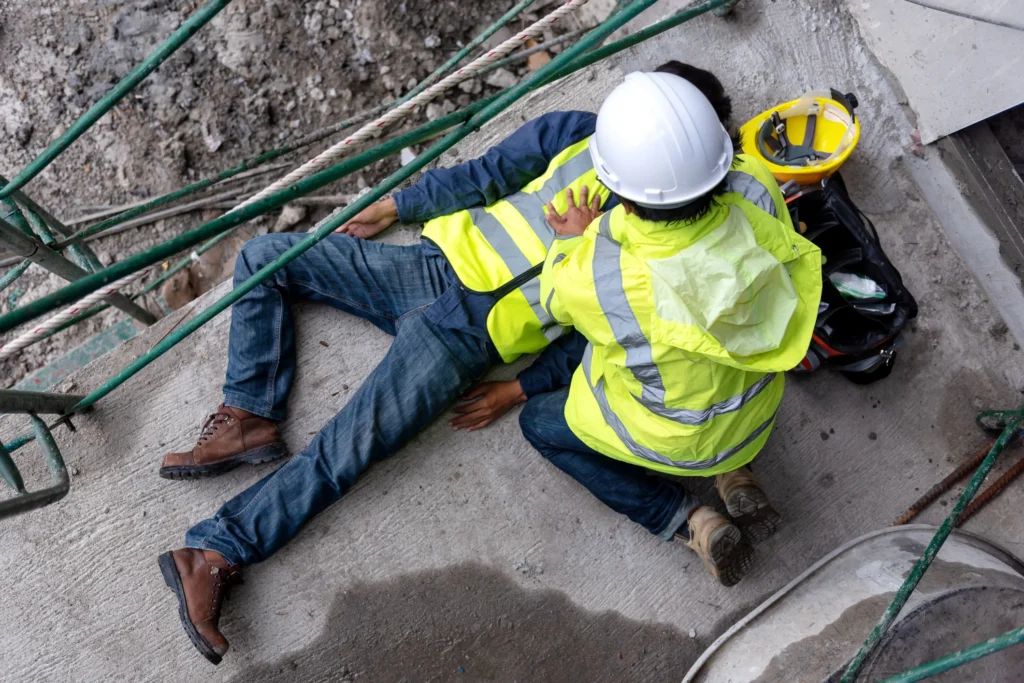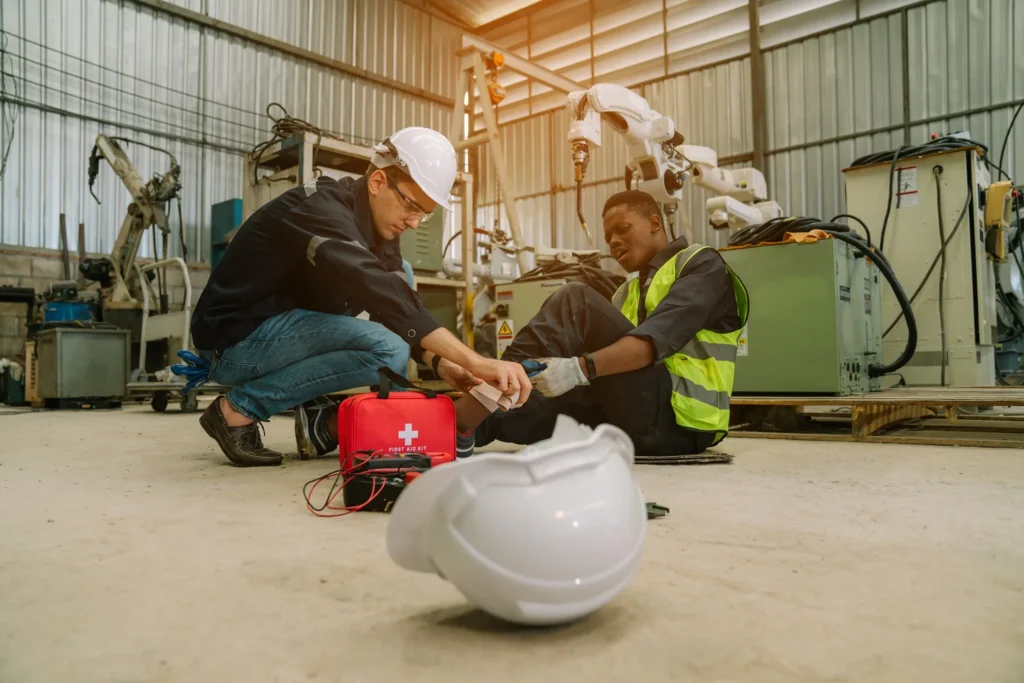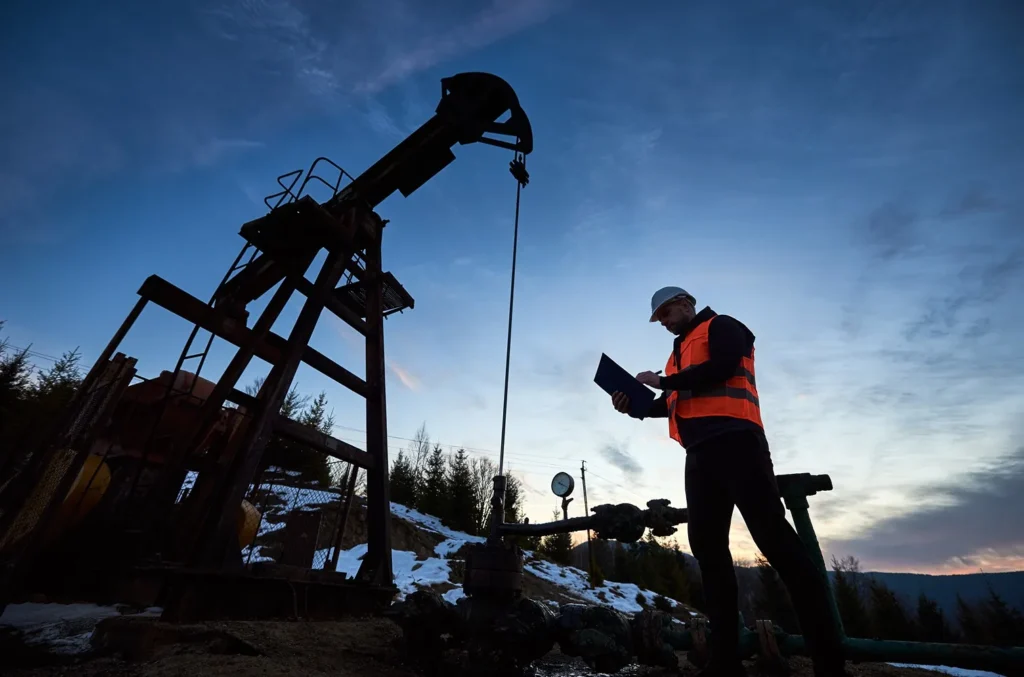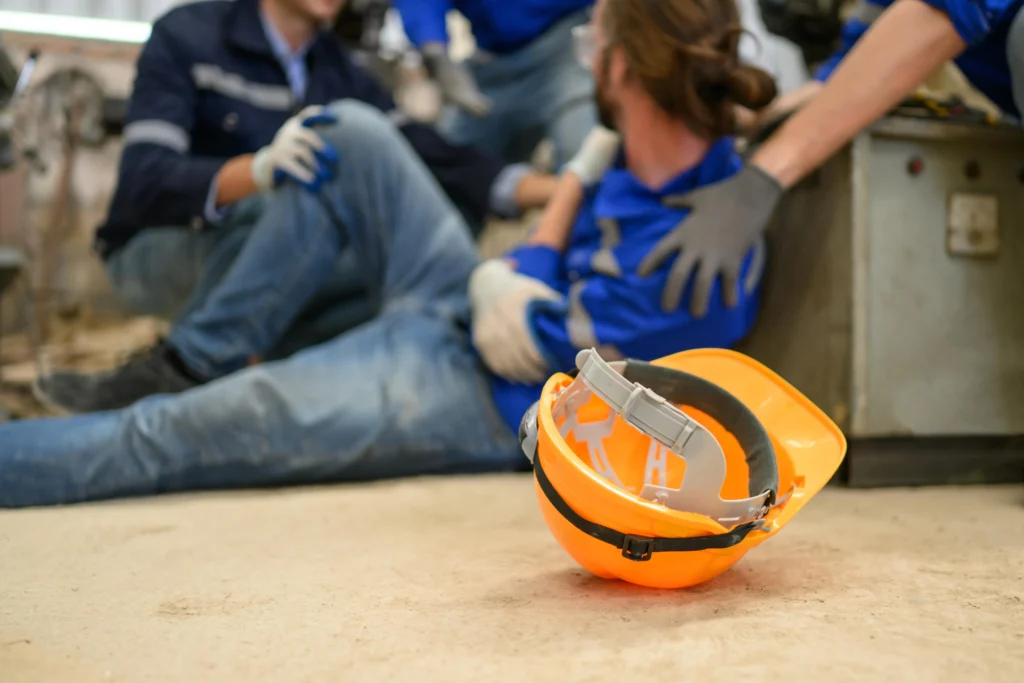AVAILABLE 24/7 | FREE INITIAL CONSULTATION
What Are Heavy Equipment Injuries in a Work Accident and Why Should I Get a Lawyer
 If you or someone close to you has suffered injuries from heavy equipment at work, grasping the gravity of legal help becomes imperative. The consequences of such injuries are often profound, leading to disabilities like amputations, severe spinal damage, or even tragic loss of life. These incidents not only cause physical and emotional distress but also involve legal issues concerning compensation, liability, and insurance intricacies.
If you or someone close to you has suffered injuries from heavy equipment at work, grasping the gravity of legal help becomes imperative. The consequences of such injuries are often profound, leading to disabilities like amputations, severe spinal damage, or even tragic loss of life. These incidents not only cause physical and emotional distress but also involve legal issues concerning compensation, liability, and insurance intricacies.
Legal guidance is crucial in these situations. If you’re facing such a challenge, don’t face this alone. Call Campos Law Group at 512-233-6947 today for the support and representation you deserve.
Heavy Equipment Injuries
Heavy equipment injuries are commonplace in high-risk industries such as construction, transportation, agriculture, manufacturing, and mining. These injuries can range from deep lacerations and broken bones to concussions, spinal cord injuries, and even amputations. The severity of a workplace injury often depends on the accident scenario, where one might be pinned under the equipment, falling, or being struck by machinery, leading to a heavy machinery injury.
Accidents can occur due to equipment malfunctions, inherent flaws, or contact with equipment or objects, which is one of the most common causes of work injuries.
Types of Heavy Equipment Injuries
Injuries from heavy equipment accidents are as varied as they are devastating. They often involve crushing, pinning, and entanglement, which can lead to serious injuries or even fatalities. These accidents can result in spinal cord injuries, head and neck injuries, broken bones, concussions, and electrical burns. In more brutal cases, victims may suffer cuts, lacerations, digit amputations, and even severed limbs.
Survivors of heavy equipment accidents may suffer from physical disfigurement and may require extensive rehabilitation. The aftermath of the accident often involves intensive medical attention, emergency transportation, surgery, hospitalization, and life-saving measures.
Causes of Heavy Equipment Accidents
 The causes of heavy equipment accidents are multifaceted. More often than not, these accidents are attributed to human error and inadequate training, leading to improper operation or neglect of safety procedures by workers and supervisors. Mechanical failures in crucial components, such as hydraulic systems and brakes, can also result in dangerous heavy machinery accidents during the operation of heavy machinery.
The causes of heavy equipment accidents are multifaceted. More often than not, these accidents are attributed to human error and inadequate training, leading to improper operation or neglect of safety procedures by workers and supervisors. Mechanical failures in crucial components, such as hydraulic systems and brakes, can also result in dangerous heavy machinery accidents during the operation of heavy machinery.
Additionally, procedural negligence, such as improper assembly or installation and failure to adhere to lockout/tagout protocols, can precipitate accidents with heavy equipment. Environmental factors like adverse weather, uneven terrain, and limited visibility can also add significant risk to the operation of heavy equipment, leading to potential accidents.
The Importance of Legal Representation
Navigating the aftermath of a heavy equipment accident can be a daunting task, especially when you’re dealing with physical and emotional pain. Legal representation is key in expediting settlements in compensation or insurance claims while ensuring strong case management. As experienced lawyers at Campos Law Group, our aim is to analyze accident causes, identify liable parties including contractors and manufacturers, and deal with legal claims to protect victims’ rights.
Immediate legal representation is vital in heavy equipment injury cases to access crucial eyewitness testimonies and documentation, which fortifies the case. Many heavy equipment accident lawyers, including us, work on a contingency fee basis, removing the barrier of upfront legal fees and aligning our payment with the successful resolution of the case. Let us fight for you. Don’t wait.
Workers’ Compensation Claims
Workers’ compensation claims serve as a lifeline for injured workers, providing a safety net in the face of mounting medical bills and lost wages. However, the process of filing these claims and obtaining workers’ compensation benefits can be overwhelming. This is where our experience comes into play. As lawyers with a focus on workers’ compensation claims, we guide injured workers through these procedures, making sure all required paperwork is accurately filled out and submitted on time under legal deadlines.
We adopt an active stance on these cases, delving into the incident, facilitating access to medical care, and collecting further data critical for a successful claim. We advise on the use of approved medical care providers and ensure that medical treatment is properly documented for the workers’ compensation claim. In the event of a denied workers’ compensation claim, we can appeal the decision, pursuing the injured worker’s rights to compensation.
Third-Party Liability Claims
In some cases, a workers’ compensation claim may not be the only avenue for seeking compensation. If a third party, such as a contractor, equipment supplier, or maintenance company, is found to be at fault, a third-party liability claim may be viable. At Campos Law Group, we can assess an accident for such claims, building a case by examining contracts, safety plans, witness statements, and highlighting the intersection of workers’ compensation and negligence systems.
Compensation from third-party claims can cover:
- Medical expenses, covering both immediate treatment costs and any ongoing healthcare needs that may arise from the injury.
- Lost wages, compensating for the time the injured worker is unable to work and earn an income due to the accident.
- Future earnings impact, accounting for the potential long-term effects on the worker’s ability to earn a similar income as before the injury.
- Pain and suffering, acknowledging the non-economic damages such as emotional distress and the overall decrease in life quality.
These could lead to liens on the third party’s assets if negligence is proven. When another party’s negligence is a contributing factor to the injury, we can explore third-party claims which can significantly increase the compensation available to an injured worker.
Employer Responsibilities and Liabilities
 Employers have a crucial role to play in preventing heavy equipment accidents. They may be responsible for:
Employers have a crucial role to play in preventing heavy equipment accidents. They may be responsible for:
- Providing a safe working environment
- Ensuring the proper maintenance, training, and supervision of heavy equipment operations
- Providing necessary safety devices
- Following safety mandates
When employers fail to fulfill these responsibilities, they can be held accountable and often face legal settlements.
Liability in heavy equipment injuries can extend beyond the employer, however. Third parties, such as equipment manufacturers for defective machinery and property owners for unsafe conditions, could also be held liable for accidents.
Training and Certification
Training and certification for heavy equipment operators are vital for ensuring safety and proficiency on the job site. For instance, crane operators are required by OSHA to be certified if they operate cranes weighing over 2,000 pounds, and certifications can be obtained through the National Commission for the Certification of Crane Operators (NCCCO). Once certified, operators must complete recertification within a specific period to maintain their credentials.
Training programs for operators encompass practical exercises, simulations, and feedback sessions, which are vital for ensuring safety and proficiency. Simulated environments and real-world scenarios used in training teach operators to adhere to safety protocols, even during equipment malfunctions or emergencies. Hands-on training also includes learning clear communication using standard hand signals and radio communication to maintain safety on the job site.
Maintenance and Inspection
Regular maintenance and inspections of heavy equipment are integral to preventing accidents and ensuring compliance with safety regulations. These procedures can help in:
- Identifying faults that could result in accidents, injuries, or fatalities
- Detecting and addressing wear, tear, and minor issues in heavy equipment
- Preventing larger problems and potential accidents
By conducting regular maintenance and inspections, you can ensure the safety and efficiency of your heavy equipment.
Adherence to OSHA regulations through routine maintenance helps prevent penalties during inspections, and the implementation of lockout/tagout procedures is critical for controlling hazardous energy during maintenance. Utilizing a heavy equipment maintenance checklist ensures that all critical components, such as fluid levels and potential damages, are reviewed to prolong equipment lifespan and maintain optimal performance.
Compensation for Heavy Equipment Injuries
Legal intervention is pivotal to ensuring that workers receive compensation for lost salaries or wages from the construction company or other responsible parties after an accident, especially in complex situations where multiple parties might be liable.
Establishing an extensive documentation record, inclusive of medical examinations, test results, and related costs, is vital when validating a compensation claim after a heavy equipment injury. Witness testimonies regarding the injury and its repercussions on the injured party’s life can significantly influence the amount of compensation received, serving as powerful evidence to support the claim.
Factors Affecting Compensation
Several factors can affect the amount of compensation received in a heavy equipment injury case. The severity of the injury significantly dictates the amount of compensation; more severe injuries typically result in higher compensation. Financial losses such as medical bills and lost income or earning capacity due to the injury are substantial factors in determining compensation.
State regulations can also influence the compensation process by setting guidelines on when employers must have workers’ compensation insurance and defining employee rights. The claim process itself is often difficult, involving potential disputes with employers or insurance companies regarding the legitimacy and valuation of worker compensation claims.
Maximizing Your Claim
Maximizing compensation in a heavy equipment injury case involves a thorough investigation, evidence gathering, and strong negotiation skills. Our thorough investigation of the accident circumstances, along with evidence of any third party’s negligence, is key to presenting a strong case and maximizing compensation.
Understanding that insurance adjusters often aim to minimize payouts, it is vital to enter negotiations with the idea that the first settlement offer is frequently less than the claim’s worth. Maximizing the settlement may entail a comprehensive evaluation of:
- Work restrictions
- Disability ratings
- Past and predicted earnings
- Past and future medical expenses
Legal support is vital when grappling with workers’ compensation claims, which involves precise filing of the initial claim, managing the appeal process, and contesting any unfair denials.
Preventing Heavy Equipment Accidents
 Preventing heavy equipment accidents is a key component of maintaining a safe working environment. This involves:
Preventing heavy equipment accidents is a key component of maintaining a safe working environment. This involves:
- Implementing safety protocols
- Maintaining equipment
- Ensuring effective communication among workers
- Conducting daily inspections for underground hazards and overhead obstructions before starting work
- Performing a pre-operation walkaround to identify potential dangers and address equipment issues
Maintaining three points of contact when entering or exiting equipment and ensuring that blind spots are clear, or using a spotter when necessary, helps to reduce fall hazards and prevent accidents. Buckling up when operating heavy equipment can prevent severe injuries in an accident, and the equipment should not be overloaded beyond its specific load limits to avoid tipping, load drops, or failure.
Implementing Safety Protocols
Compliance with established safety protocols is a key factor in preventing heavy equipment injuries.
Employers must maintain a safe work environment by providing necessary safety equipment like machine guards and protective gear, and ensuring systems for fall and rollover protection are in place. The use of heavy equipment maintenance software facilitates the scheduling of maintenance appointments and centralizes maintenance data, contributing to safety and preventing breakdowns.
The Role of Communication
Transparent communication between heavy equipment operators and other site workers is essential for maintaining vigilance and preventing mishaps. A lack of proper communication can result in accidents, highlighting the need for clear interactions to prevent misunderstandings and ensure clarity.
Using two-way radios and other communication tools such as hand signals can help operators maintain awareness of their surroundings and ongoing communication with supervisors, thus avoiding accidents.
Site managers have the responsibility to ensure that crews are properly informed of changing conditions that could impact safety, underscoring the critical role of communication from management.
How Campos Law Group Can Help You
Understanding the causes and types of injuries, knowing your rights and responsibilities, and being aware of the legal implications are all crucial steps in this process. Whether you’re an injured worker, an employer, or a concerned family member, being informed and seeking prompt legal representation can make a significant difference in the outcome of these cases.
At Campos Law Group, we’re committed to helping you through this challenging time by offering comprehensive legal services. We believe in the power of information and advocacy in seeking justice and fair compensation. Remember, you’re not alone in this journey. We’re here to help and support you every step of the way.
We understand the toll heavy equipment accidents can take, not just physically, but emotionally and financially as well. We investigate the details of the case, gather evidence, and construct a robust legal strategy to maximize the chances of receiving full and fair compensation.
We’re more than just your legal representatives – we’re your allies in the fight for justice and fair compensation after an injury. Our commitment to our clients’ well-being and our dedication to upholding their legal rights set us apart. If you or a loved one has been injured in a heavy equipment accident, don’t hesitate to reach out to us at 512-233-6947 for a free consultation.
Frequently Asked Questions
What must employers do to protect workers from being struck by hazards?
Employers must provide proper PPE, such as hard hats, safety glasses, and face shields, to protect workers from struck-by hazards. It is a crucial responsibility to ensure the safety of all employees.
How long do I have to file a claim after a heavy equipment accident?
In most jurisdictions, there is a statute of limitations that dictates how long you have to file a claim after a heavy equipment accident. This period can vary, but it typically ranges from one to three years from the date of the accident. It’s essential to consult with a lawyer as soon as possible to ensure your claim is filed within the legal timeframe.
How does Campos Law Group handle cases involving multiple liable parties?
When dealing with cases that involve multiple liable parties, Campos Law Group meticulously analyzes all aspects of the incident to identify each party’s role in the accident. We gather evidence, scrutinize contracts, safety records, and witness statements to build a comprehensive case. Our legal team coordinates with experts to establish the extent of each party’s liability, ensuring that our clients’ claims address all potential sources of compensation. By doing so, we aim to maximize the recovery for our clients and hold all negligent parties accountable for their actions.
What is the main cause of serious accidents at work?
The main cause of serious accidents at work is trips and falls, which are consistently one of the leading causes of workplace injuries due to factors such as slippery floors, improper footwear, rushing employees, and weather conditions.
What is the employer’s responsibility when a worker is injured?
The employer’s responsibility when a worker is injured includes providing workers’ compensation coverage, promptly providing the employee with necessary forms, and ensuring access to medical treatment. It’s important to follow labor regulations and maintain accurate records of the incident.
Can I still file a claim if the heavy equipment accident was partly my fault?
Even if you are partially at fault for a heavy equipment accident, you may still be eligible to file a claim. Workers’ compensation is typically a no-fault system, meaning you can receive benefits regardless of who was at fault for the injury. However, the specifics can vary by state, and there may be limitations if negligence is involved. It’s crucial to consult with a legal expert to understand your rights and options.
What does Campos Law Group do to help their clients?
Campos Law Group investigates the case thoroughly, gathers evidence, and builds a strong legal strategy to help their clients receive full and fair compensation.

Free Consultation
” * ” Indicates Required Fields


